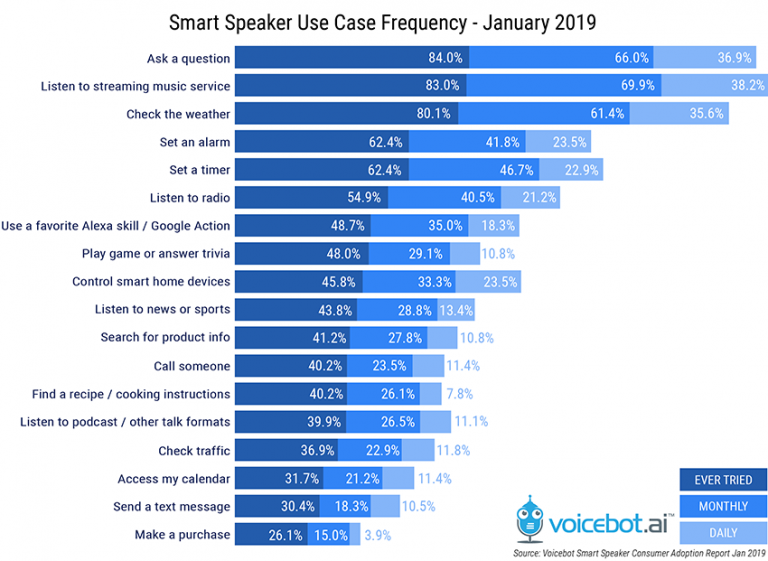Exploring Business Uses for Smart Speakers

Business uses for smart speakers
Smart speakers explained
- “Alexa, ask Marco’s Pizza to order my favorite pizza.”
- “Ok Google, ask Rosie’s Wines what pairs well with salmon.”
- “Alexa, ask City Library when my books are due.”
Voice as a business strategy
[WEBINAR] Building Voice Apps for Your Business. Watch Now
Smart speakers for business use

Here are some business uses for smart speaker ideas that can be put to use within an organization to improve workforce effectiveness.
Simplifying conference room meetings
Alexa Skills and Google Actions can be created for conferencing devices where employers can install smart voice devices at their workplace. They are placed in conference rooms to launch and control the conferencing systems. When the device is installed, the skill syncs with Google Calendar and assists in identifying the next scheduled conference call. It gives the employees the benefit of voice access to their business calendars, meetings and the facility to control the conferencing equipment.
Connecting employees
Employees can attend meetings having smart speakers placed on their desks. It’s a great advantage for those working on small and medium-sized companies. They can have their own devices at offices to help them enhance their productivity by managing their calendars, to-do lists and access to other personal skills irrespective of whether they are in their office or home. Voice assistant devices lets you ensure that all are connected while the conference is on.
Updating to-do lists & tracking tasks
Entrepreneurs can use Alexa and Google Actions to schedule items that can be accessed easily through Alexa & Google apps. Using a voice skill, you can set calendar reminders which will prompt Alexa to notify you just before the scheduled meeting.
Managing travel itineraries
Voice assistants can help in organizing business travels such as tracking flight booking status, keeping an update of flight history. Using the skill, the employees can plan a business trip, get notifications for flight delays and cancellations. Customized skills assist in the mapping of seats, tracking the weather updates and to have complete coordination over the travel experience.
Smart inventory management
The skills and actions could be used in managing inventory efficiently. Reports of inventory data could be easily accessed from anywhere, anytime, without having to fiddle with complex software or spreadsheets.
Expense Tracking
Expense tracking is an important activity of any business. Alexa skills like Expense Manager helps the users to log, analyze and gain insights on their activity.
Voice & Analytics metrics
The skills and analytics page on Amazon developer console, Google console lets the user track all the useful information regarding the skill. It gives useful information about how the skill is performing and how customers are using it.
Secrets of building an amazing smart voice skill
- A good skill or action should combine convenience with speed.
- It should have smooth interaction flow leading to personalized communication with target customers.
- A voice skill should provide fresh content to drive the user to use the skill more frequently.
- The user must be able to interact with the skill irrespective of the location.
For a skill and action to perform among the audience, things to be kept in mind are:
- The skill/action should be able to solve a real problem
- The skill should be a pleasure to interact with
- it should be constantly reliable
For those who are looking to the future, developing a useful skill that meets the customer’s requirements can be an effective way to support your business mission. Need a little help getting started with a voice (marketing) strategy for your business? Contact VOGO Voice today to get your skill ready. We can guide you right from idea creation to deployment with our expertise.
VOGO Voice designs and builds engaging voice skills for industries including education, civic, transportation, business, and nonprofits using our robust voice user interface platform that allows data integration and in-depth customization. VOGO Voice build you the best of class voice app that is compatible with both Amazon Alexa and Google Assistant. Get in touch with our professional team today to hand your citizens, customers, and workforce a high-definition voice-activated solution to keep pace with their demand.
